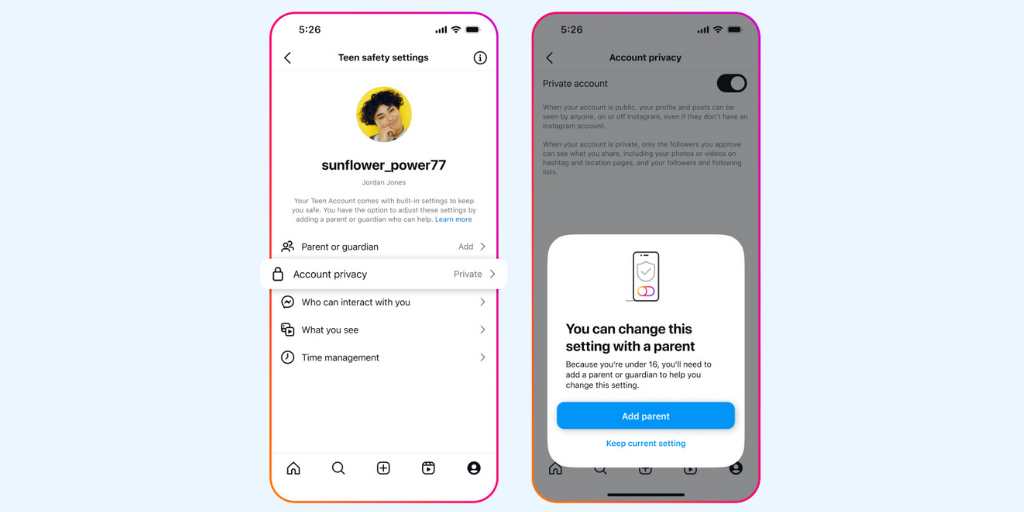
Welcome to Parent Pixels, a parenting newsletter filled with practical advice, news, and resources to support you and your kids in the digital age. This week:
🛡️ Meta announces Teen Accounts: If your teen uses Instagram, their account will automatically convert to a Teen Account with added safety protections over the next few months. The update, which affects all new and existing accounts for teens ages 13–17, comes as social media companies face mounting pressure to do better for their youngest users. Many of the features have existed since 2021, but required users to opt in. Now, these protections will be automatically applied, along with improved age verification measures.
Some of the key features for teen accounts include:
Parents can also use updated supervision tools to see the topics their teen engages with and who they’re messaging, although you won’t be able to view the content of the messages. (To monitor those Instagram DMs, you’ll need BrightCanary.)
Our take: It’s about time. Instagram’s existing parental controls were confusing and difficult to find. This update applies common-sense safety measures to teen accounts, but parents still need to stay involved — and make sure their teen isn’t fibbing about their age online.
⚖️ KOSA and COPPA 2.0 advance in the House: Two major child online safety bills have moved out of the House Committee on Energy and Commerce: the Kids Online Safety Act (KOSA) and the Children and Teens’ Online Privacy Protection Act (COPPA 2.0). KOSA would hold social media accountable for harm caused to underage users, while COPPA 2.0 expands and updates the outdated 1998 COPPA law. KOSA had previously passed the Senate but faced some last-minute amendments in theHouse committee, including the removal of a provision that would have held platforms responsible for mitigating anxiety, depression, and eating disorders. While both bills are now set for a full vote in the House, it’s not clear whether they’ll gain enough support to pass.
😬 FTC finds that social media companies don’t adequately protect kids: A new FTC report found that large social media and video streaming companies surveilled their consumers in order to monetize their personal information, and they failed to protect young users online. The companies cited in the report include Amazon (which owns the gaming platform Twitch), Meta, Snap, Discord, and ByteDance, which owns TikTok. The companies’ data collection, minimization, and retention practices were designed as “woefully inadequate,” which is as harsh a burn from the FTC as you can get, and urged companies to provide greater safety measures for children. The FTC also urged Congress to pass stricter federal privacy legislation.
Parent Pixels is a biweekly newsletter filled with practical advice, news, and resources to support you and your kids in the digital age. Want this newsletter delivered to your inbox a day early? Subscribe here.
If your child uses Snapchat, you’ve probably heard of the social clout Snapstreaks can have. But what is a Snap streak, how do they work, and should parents be worried?
Monitoring your child's texts can reveal warning signs of risky behavior or distress, but what should parents look for? We spoke with psychoanalyst and life coach Anna Marcolin for tips.
From the moment your child gets home, they’re thinking about what’s happening on Instagram or what their friends are sharing on Snapchat. If your child is hyper-focused on social media and dealing with FOMO (fear of missing out), it’s time to help them refocus their energy on real-life hobbies, interests, and activities. Here’s how to start the conversation.
😤 What is the worst argument social media companies use to defend themselves? “Instead of acknowledging the damage their products have done to teens, tech giants insist that they are blameless and that their products are mostly harmless,” write Zach Rausch, Jon Haidt, and Lennon Torres for The Atlantic.
👎 Nearly half of Gen Zers wish social media was never invented, according to a new survey by The Harris Poll. Eight in 10 Gen Zers have taken steps to limit social media usage at some point, such as unfollowing or muting an account (42%) or deleting a social media app (40%).
📰 Around half of TikTok users (52%) now say they regularly get their news on the platform, up from 43% last year and just 22% in 2020.
📅 The Australian government is considering a minimum age limit for teens to use social media, citing mental health concerns.